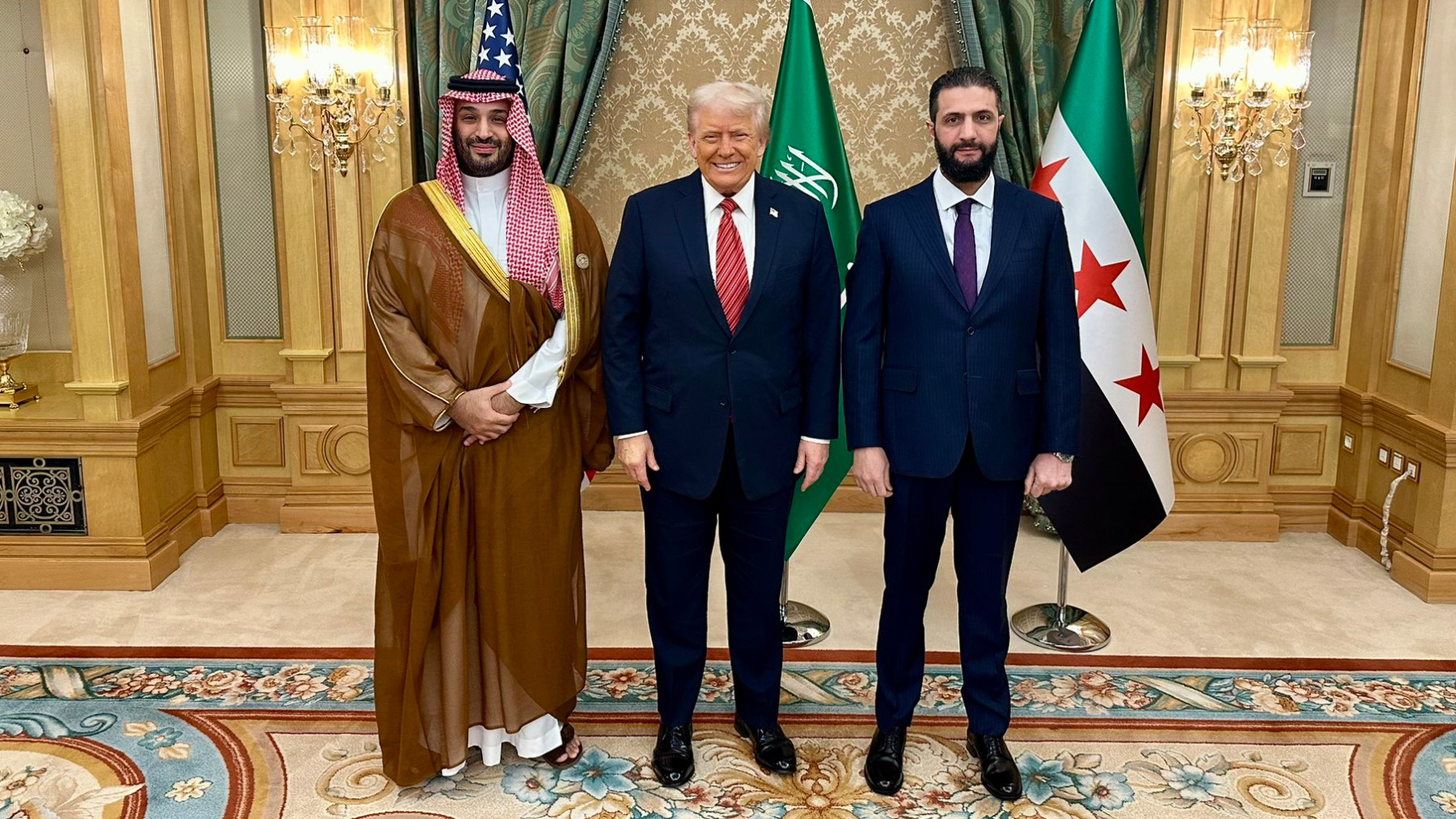Donald Trump has revealed that his administration is now actively considering restoring diplomatic ties with Syria—an announcement that came shortly after an unexpected meeting with Ahmed al-Sharaa, Syria’s acting president, whose coalition ended the long-standing Assad regime.
The meeting, remarkable in its symbolism and once unimaginable, lasted just 37 minutes but was loaded with geopolitical significance.
“He shows real promise,” Trump said following the encounter in Riyadh, which took place in an opulent Saudi royal palace. Sharaa, once a battlefield commander linked to al-Qaeda, has rapidly risen to global political prominence.
A $10 million reward once offered by the U.S. for information leading to Sharaa’s capture had only been rescinded five months earlier. Video recordings of the session captured brief moments of unease as the two men spoke through an interpreter.
Saudi Crown Prince Mohammad bin Salman, grinning throughout, sat beside them. Turkish President Recep Tayyip Erdoğan participated in the meeting via phone.
Trump later acknowledged that these two regional leaders were pivotal in persuading him to ease the strict sanctions the U.S. had imposed on Syria.
The surprise announcement was delivered Tuesday evening at a high-profile U.S.–Saudi economic forum in Riyadh and received with applause. It marked a dramatic pivot from Trump’s earlier statements that the U.S. had “nothing to gain” from involvement in Syria. Speaking to reporters afterward, Trump described Sharaa as “a strong figure with a turbulent past.”
The comment reflected Trump’s style, glossing over Sharaa’s prior involvement with Hayat Tahrir al-Sham (HTS), a Syrian Islamist militia that until 2016 had close ties to al-Qaeda. HTS is still classified as a terrorist group by major international powers.
Since coming to power in December, Sharaa has adopted a Westernized public image, donning business suits and positioning himself as a leader for all Syrians.
“This is finally a ray of hope,” declared Hind Kabawat, minister of social affairs and labor in Syria’s transitional cabinet.
She said their leadership had been calling for sanctions relief ever since the day Assad was ousted, which she referred to as their “Liberation Day.”
The U.S. decision triggered celebrations across a war-weary nation where the vast majority of the population—some 90%—are estimated to live in poverty after years of brutal civil conflict and economic collapse.
Lifting sanctions that have isolated Syria from the global financial system may now allow aid organizations to return and foster interest from investors and global markets.
“We are the North Korea of the Middle East,” a hotel clerk in Damascus told a visitor last December when asked for a replacement room keycard. With tears in his eyes, he added, “We run short of everything, even plastic.”
The easing of restrictions may also encourage displaced Syrians to consider returning to their homeland. The transitional administration hopes that financial relief will help stabilize the economy, allow for wage payments, launch reconstruction efforts, and reduce widespread discontent.
However, unraveling the intricate web of sanctions that currently suffocates the Syrian economy will be no simple task.
“Some restrictions can be removed immediately by executive order,” explained Dina Esfandiary, an analyst with Bloomberg Economics.
“But eliminating the layers of sanctions imposed over many years will demand sustained effort and clear political will from the Trump White House.”
This situation bears resemblance to the aftermath of the 2015 Iran nuclear accord. When U.S. sanctions were relaxed, many Iranian reporters still expressed frustration that they couldn’t even open a bank account despite the deal being in place.
Syria’s new allies—including key regional players such as Saudi Arabia and Turkey—are now maneuvering to help shape the nation’s future. Yet Trump has made it clear that his support hinges on concessions.
Chief among his conditions is for Syria to join the Abraham Accords, a U.S.-brokered normalization initiative with Israel that has already been signed by countries like the UAE and Bahrain. Trump regards this agreement as a central legacy of his foreign policy.
Sharaa, whom allies describe as pragmatic, has reportedly indicated openness to that prospect, despite ongoing Israeli airstrikes targeting military assets in Syria said to pose a threat to regional stability.
According to reports, Sharaa told U.S. Congressman Cory Mills during a recent visit that Syria was willing to establish diplomatic ties with Israel and join the accords—under the right conditions.
Israeli news sources say Prime Minister Benjamin Netanyahu had urged Trump not to ease the pressure on Syria. He remains wary of Sharaa and the remnants of HTS, as well as other foreign militant groups operating in the country.
Among the demands from Washington is the expulsion of these foreign fighters—a task that now looms large over Sharaa’s administration.
Still, Trump described the current moment as “a real opportunity for greatness.” For millions of Syrians, the real hope is simply the chance for life to begin improving.







